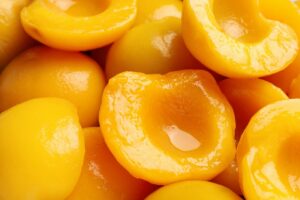 Peach season is upon us, and it’ll be here until September. So, if you’re looking for a tasty, sweet, seasonal fruit that can spruce up meals and snack time, you’re in luck.
Peach season is upon us, and it’ll be here until September. So, if you’re looking for a tasty, sweet, seasonal fruit that can spruce up meals and snack time, you’re in luck.
The sweet taste of peaches is a major benefit for many, especially those who may need a little more coaxing into eating fruit and vegetables. Peaches are quite versatile and can be added to kale or spinach salads, used as a yogurt topping, added to smoothies or salsa, or even browned on the grill.
Advertisement
Because of the fairly short season, you only have a limited window to enjoy locally grown peaches.
Peaches are known for their golden color and soft fuzzy skin. They are loaded with vitamin C, other antioxidants, potassium, and soluble and insoluble fiber. They are also low in fat and contain no sodium or cholesterol.
The fresher your peaches are, the more nutrients you get from them. Locally grown, seasonal options that get to your table faster ensure more antioxidants and nutrients than imported varieties and help you support local farmers.
Some potential benefits of the nutrients in peaches include stronger immunity, better heart health, and improved digestion and gut health. Because of their high fiber content, peaches can also help you feel fuller, longer.
Many of the antioxidants and fiber are found in the skin of the peach.
Peaches continue to ripen after they’ve been picked, and a firm peach may ripen over one to three days if stored at room temperature. That can extend to about a week in the fridge.
Advertisement
Like other fruits, peaches can be used to enhance the taste of vegetables and make them more palatable for some people. They can add sweetness to kale or spinach, making it easier for some to adopt a healthy diet.
Be careful of adding dried peaches to salads. Although they are available year-round and feature many of the nutrients of fresh peaches, the dehydrated process concentrates the sugar and makes them less filling, making it harder to control portion sizes.
Lastly, peaches will retain their nutritional value when frozen, so you can enjoy them after the season ends!
